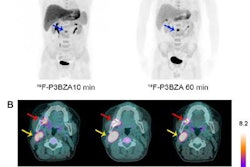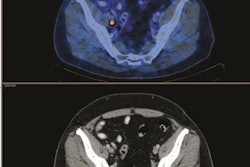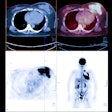FDG-PET/CT scans performed during early treatment for melanoma could help clinicians identify whether the therapy will benefit a particular patient, according to a study published in the September issue of the Journal of Nuclear Medicine.
Patients with advanced melanoma, in which the cancer has spread to other parts of the body, often have a poor prognosis. However, some may benefit from treatment with an immune checkpoint inhibitor (ICI).
In the current study, researchers from Johns Hopkins University prospectively evaluated 20 patients with advanced melanoma to determine early response to immune checkpoint inhibitor therapy. Each subject had three scans: before treatment, at 21 to 28 days, and at four months.
Lead author Dr. Steve Cho and colleagues were able to develop criteria that predicted eventual response to immune checkpoint inhibitors with 100% sensitivity, 93% specificity, and 95% accuracy (JNM, September 2017, Vol. 58:9, pp. 1421-1428).
The researchers also noted a small increase in FDG tumor uptake at an early time point, which may prove a good indication that the tumor is responsive to the immune therapy.
"Combining functional and anatomic imaging parameters from FDG-PET/CT scans performed early in ICI appears predictive for eventual response in patients with advanced melanoma," the group concluded.




















